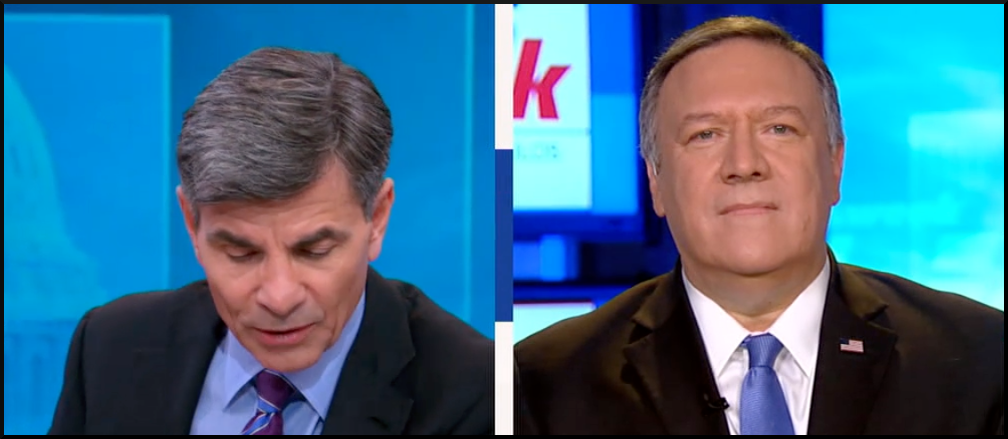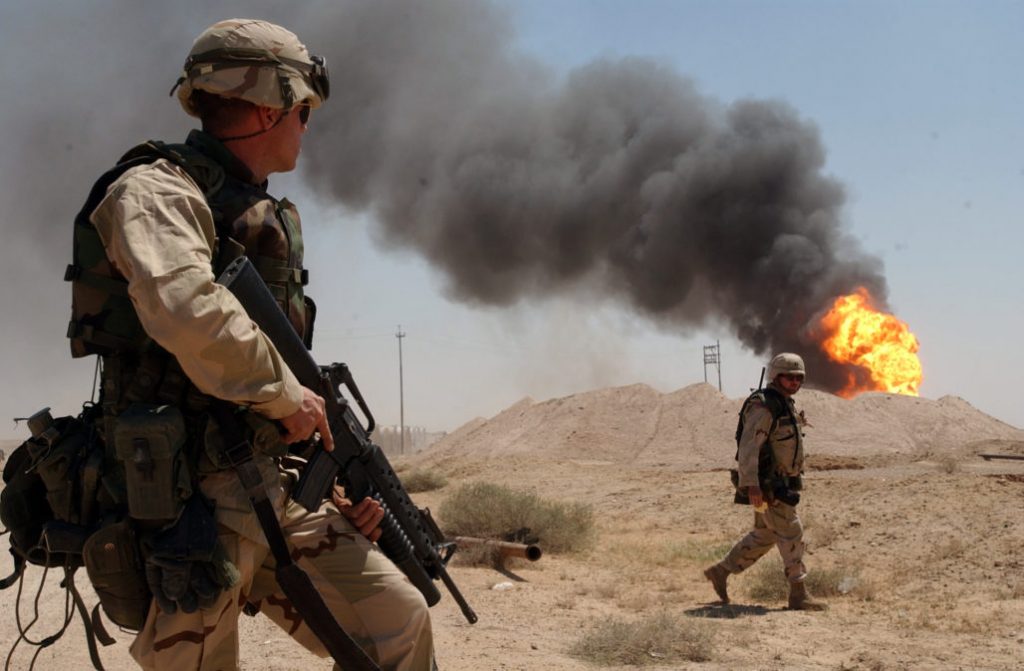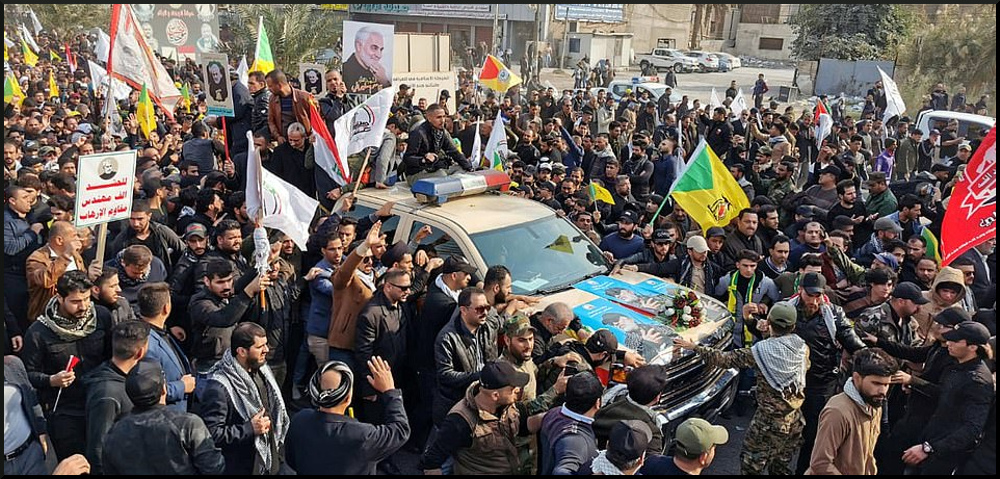by Patrick Lawrence, published on Consortium News, January 21, 2020
Of all the preposterous assertions made since the drone assassination of Qassem Soleimani in Baghdad on Jan. 3, the prize for bottomless ignorance must go to the bottomlessly ignorant Mike Pompeo.
Speaking after the influential Iranian general’s death, our frightening secretary of state declaimed on CBS’s Face the Nation, “There was sound and just and legal reason for the actions the President took, and the world is safer as a result.” In appearances on five news programs on the same Sunday morning, the evangelical paranoid who now runs American foreign policy was a singer with a one-note tune. “It’s very clear the world’s a safer place today,” Pompeo said on ABC’s Jan. 5 edition of This Week.
In our late-imperial phase, we seem to have reached that moment when, whatever high officials say in matters of the empire’s foreign policy, we must consider whether the opposite is in fact the case. So we have it now.
We are not safer now that Soleimani, a revered figure across much of the Middle East, has been murdered. The planet has just become significantly more dangerous, especially but not only for Americans, and this is so for one simple reason: The Trump administration, Pompeo bearing the standard, has just tipped American conduct abroad into a zone of probably unprecedented lawlessness, Pompeo’s nonsensical claim to legality notwithstanding.

This is a very consequential line to cross.
Hardly does it hold that Washington’s foreign policy cliques customarily keep international law uppermost in their minds and that recent events are aberrations. Nothing suggests policy planners even consider legalities except when it makes useful propaganda to charge others with violating international statutes and conventions.
Neither can the Soleimani assassination be understood in isolation: This was only the most reckless of numerous policy decisions recently taken in the Middle East. Since late last year, to consider merely the immediate past, the Trump administration has acted ever more flagrantly in violation of all international legal authorities and documents — the UN Charter, the International Criminal Court, and the International Court of Justice in the Hague chief among them.
Washington is into full-frontal lawlessness now.
‘Keeping the Oil’
Shortly after Trump announced the withdrawal of U.S. forces from northern Syria last October, the president reversed course — probably under Pentagon and State Department pressure — and said some troops would remain to protect Syria’s oilfields. “We want to keep the oil,” Trump declared in the course of a Twitter storm. It soon emerged that the administration’s true intent was to prevent the Assad government in Damascus from reasserting sovereign control over Syrian oilfields.
The Russians had the honesty to call this for what it was. “Washington’s attempt to put oilfields there under [its] control is illegal,” Sergei Lavrov said at the time. “In fact, it’s tantamount to robbery,” the Russian foreign minister added. (John Kiriakou, writing for Consortium News, pointed out that it is a violation of the 1907 Hague Convention. It is call pillage.)
Few outside the Trump administration, and possibly no one, has argued that Soleimani’s murder was legitimate under international law. Not only was the Iranian general from a country with which the U.S. is not at war, which means the crime is murder; the drone attack was also a clear violation of Iraqi sovereignty, as has been widely reported.
In response to Baghdad’s subsequent demand that all foreign troops withdraw from Iraqi soil, Pompeo flatly refused even to discuss the matter with Iraqi officials — yet another openly contemptuous violation of Iraqi sovereignty.
It gets worse. In his own response to Baghdad’s decision to evict foreign troops, Trump threatened sanctions — “sanctions like they’ve never seen before” — and said Iraq would have to pay the U.S. the cost of the bases the Pentagon has built there despite binding agreements that all fixed installations the U.S. has built in Iraq are Iraqi government-owned.
At Baghdad’s Throat
Trump, who seems to have oil eternally on his mind, has been at Baghdad’s throat for some time. Twice since taking office three years ago, he has tried to intimidate the Iraqis into “repaying” the U.S. for its 2003 invasion with access to Iraqi oil. “We did a lot, we did a lot over there, we spent trillions over there, and a lot of people have been talking about the oil,” he said on the second of these occasions.

Baghdad rebuffed Trump both times, but he has been at it since, according to Adil Abdul–Mahdi, Iraq’s interim prime minister. Last year the U.S. administration asked Baghdad for 50 percent of the nation’s oil output — in total roughly 4.5 million barrels daily — in exchange for various promised reconstruction projects.
Rejecting the offer, Abdul–Mahdi signed an “oil for reconstruction” agreement with China last autumn — whereupon Trump threatened to instigate widespread demonstrations in Baghdad if Abdul–Mahdi did not cancel the China deal. (He did not do so and, coincidentally or otherwise, civil unrest ensued.)
Blueprints for Reprisal
If American lawlessness is nothing new, the brazenly imperious character of all the events noted in this brief résumé has nonetheless pushed U.S. foreign policy beyond a tipping point.
No American — and certainly no American official or military personnel — can any longer travel in the Middle East with an assurance of safety. All American diplomats, all military officers, and all embassies and bases in the region are now vulnerable to reprisals. The Associated Press reported after the Jan. 3 drone strike that Iran has developed 13 blueprints for reprisals against the U.S.
Lawlessness begets lawlessness is the operative (and obvious) principle.
In a remarkable speech at the Hoover Institution last week, Pompeo termed the Soleimani assassination “the restoration of deterrence” and appeared to promise other such operations against other nations Washington considers adversaries. Ominously enough, Pompeo singled out China and Russia.
Here is a snippet from Pompeo’s remarks:
“In strategic terms, deterrence simply means persuading the other party that the costs of a specific behavior exceed its benefits. It requires credibility; indeed, it depends on it. Your adversary must understand not only do you have the capacity to impose costs but that you are, in fact, willing to do so…. In all cases we have to do this.”
Against the background of the events noted above, it is clear from this speech alone that our secretary of state is a dangerously incompetent figure when it comes to judging global events, the proper responses to them, and the probable consequences of a given response. If we are going to think about costs, the heaviest will fall on Americans in months to come.
Immediately after the U.S. drone that killed Soleimani at Baghdad International Airport, Mohammad Javad Zarif sent out a message whose importance should not be missed. “End of US’s malign presence in West Asia has begun,” Iran’s foreign minister wrote. These few words, rendered in Twitterese, bear careful consideration given they come from an official whose nation had just sustained a critical blow.
24 hrs ago, an arrogant clown— masquerading as a diplomat— claimed people were dancing in the cities of Iraq.
Today, hundreds of thousands of our proud Iraqi brothers and sisters offered him their response across their soil.
End of US malign presence in West Asia has begun. pic.twitter.com/eTDRyLN11c
— Javad Zarif (@JZarif) January 4, 2020
Gradually but rather certainly now, the community of nations is losing its patience with late-phase imperial America. With exceptions such as Japan and Israel, the Baltics and Saudi Arabia, this is so across both oceans and more or less across the non–Western world. In the Middle East, the American presence will remain for the time being, but we are now in the beginning-of-the-end phase. This was Zarif’s meaning. And we now know the end will come neither peaceably nor lawfully.
Patrick Lawrence, a correspondent abroad for many years, chiefly for the International Herald Tribune, is a columnist, essayist, author and lecturer. His most recent book is “Time No Longer: Americans After the American Century” (Yale). Follow him on Twitter @thefloutist. His web site is Patrick Lawrence. Support his work viahis Patreon site.
